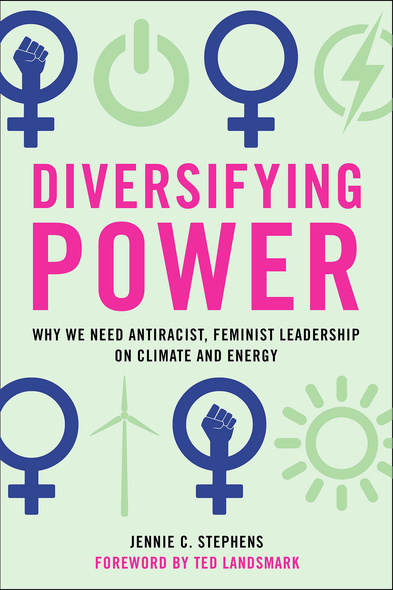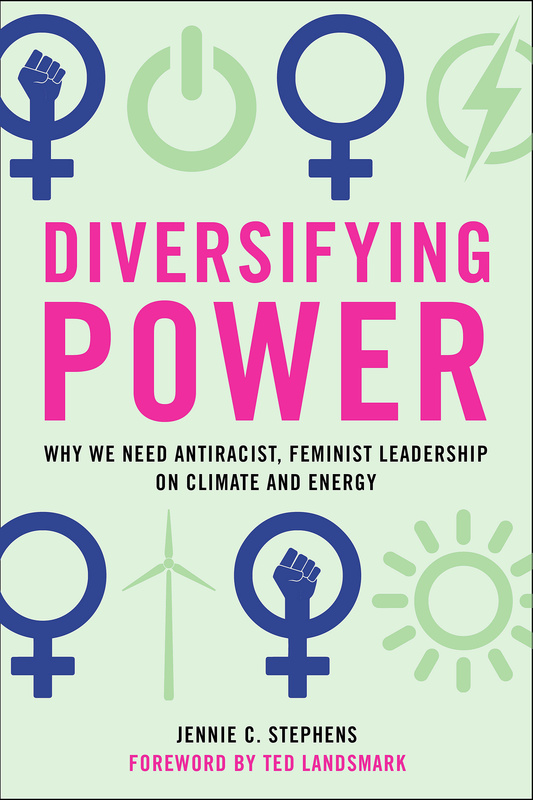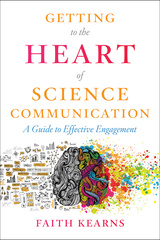Diversifying Power
Why We Need Antiracist, Feminist Leadership on Climate and Energy
By Jennie C. Stephens; Foreword by Ted Landsmark
Island Press
The climate crisis is a crisis of leadership. For too long too many leaders have prioritized corporate profits over the public good, exacerbating climate vulnerabilities while reinforcing economic and racial injustice. Transformation to a just, sustainable renewable-based society requires leaders who connect social justice to climate and energy.
During the Trump era, connections among white supremacy; environmental destruction; and fossil fuel dependence have become more conspicuous. Many of the same leadership deficiencies that shaped the inadequate response in the United States to the coronavirus pandemic have also thwarted the US response to the climate crisis. The inadequate and ineffective framing of climate change as a narrow, isolated, discrete problem to be “solved” by technical solutions is failing. The dominance of technocratic, white, male perspectives on climate and energy has inhibited investments in social change and social innovations. With new leadership and diverse voices, we can strengthen climate resilience, reduce racial and economic inequities, and promote social justice.
In Diversifying Power, energy expert Jennie Stephens argues that the key to effectively addressing the climate crisis is diversifying leadership so that antiracist, feminist priorities are central. All politics is now climate politics, so all policies, from housing to health, now have to integrate climate resilience and renewable energy.
Stephens takes a closer look at climate and energy leadership related to job creation and economic justice, health and nutrition, housing and transportation. She looks at why we need to resist by investing in bold diverse leadership to curb the “the polluter elite.” We need to reclaim and restructure climate and energy systems so policies are explicitly linked to social, economic, and racial justice.
Inspirational stories of diverse leaders who integrate antiracist, feminist values to build momentum for structural transformative change are woven throughout the book, along with Stephens’ experience as a woman working on climate and energy. The shift from a divided, unequal, extractive, and oppressive society to a just, sustainable, regenerative, and healthy future has already begun.
But structural change needs more bold and ambitious leaders at all levels, like Alexandria Ocasio-Cortez with the Green New Deal, or the Secwepemc women of the Tiny House Warriors resisting the Trans Mountain pipeline.
Diversifying Power offers hope and optimism. Stephens shows how the biggest challenges facing society are linked and anyone can get involved to leverage the power of collective action. By highlighting the creative individuals and organizations making change happen, she provides inspiration and encourages transformative action on climate and energy justice.
During the Trump era, connections among white supremacy; environmental destruction; and fossil fuel dependence have become more conspicuous. Many of the same leadership deficiencies that shaped the inadequate response in the United States to the coronavirus pandemic have also thwarted the US response to the climate crisis. The inadequate and ineffective framing of climate change as a narrow, isolated, discrete problem to be “solved” by technical solutions is failing. The dominance of technocratic, white, male perspectives on climate and energy has inhibited investments in social change and social innovations. With new leadership and diverse voices, we can strengthen climate resilience, reduce racial and economic inequities, and promote social justice.
In Diversifying Power, energy expert Jennie Stephens argues that the key to effectively addressing the climate crisis is diversifying leadership so that antiracist, feminist priorities are central. All politics is now climate politics, so all policies, from housing to health, now have to integrate climate resilience and renewable energy.
Stephens takes a closer look at climate and energy leadership related to job creation and economic justice, health and nutrition, housing and transportation. She looks at why we need to resist by investing in bold diverse leadership to curb the “the polluter elite.” We need to reclaim and restructure climate and energy systems so policies are explicitly linked to social, economic, and racial justice.
Inspirational stories of diverse leaders who integrate antiracist, feminist values to build momentum for structural transformative change are woven throughout the book, along with Stephens’ experience as a woman working on climate and energy. The shift from a divided, unequal, extractive, and oppressive society to a just, sustainable, regenerative, and healthy future has already begun.
But structural change needs more bold and ambitious leaders at all levels, like Alexandria Ocasio-Cortez with the Green New Deal, or the Secwepemc women of the Tiny House Warriors resisting the Trans Mountain pipeline.
Diversifying Power offers hope and optimism. Stephens shows how the biggest challenges facing society are linked and anyone can get involved to leverage the power of collective action. By highlighting the creative individuals and organizations making change happen, she provides inspiration and encourages transformative action on climate and energy justice.
Diversifying Power is just what is called for to lead the way toward a more equitable, resilient, and sustainable future.
Diversifying Power offers hope and optimism as Stephens shows how the biggest challenges facing society are linked and anyone can get involved to leverage the power of collective action. By highlighting the creative individuals and organizations making change happen, she provides inspiration and encourages transformative action on climate and energy justice.
Expertly written, impressively informative, insightfully thoughtful, and ultimately inspiring, Diversifying Power: Why We Need Antiracist, Feminist Leadership on Climate and Energy is a timely volume that deserves as wide a readership as possible.'
The book inspires readers to take action, get involved, and join together to address the climate crisis.
A short and punchy book that explains what feminist and anti-racist leadership looks like in a variety of sectors, and then highlights the work of particular individuals so readers can see for themselves the effect that it has.
An inspiring read.
Diversifying Power uniquely captures the voices of those that have far too often been unseen and unheard. Compiled into an impressive set of stories and strategies, each page will take you to the precipice of change and ask the simple question, ‘are you ready for a twenty-first century movement?’. If the answer is ‘yes’, read this guide to winning on social justice and climate change.
Stephens shows the urgent need to prioritize leadership that truly represents the gender and racial diversity of our cities, states, and nations. This critically important book inspires and guides transformative action toward climate justice.
This book powerfully highlights where leadership in the climate fight actually comes from. It's been clear for a long time who gets hit hardest by global warming—and it's clear too who hits back hardest. The people profiled here are heroes, and there are more rising up every day!
As climate change and Covid-19 further expose and exacerbate deep inequities and injustices across society, diverse leaders are rising up to demand and create a just and sustainable future. In Diversifying Power, Jennie Stephens tells their stories with clear-eyed urgency and optimism – and calls on us all to build inclusive power toward the transformational change we need. Read this, get inspired and act!
Diversity and inclusion are seldom discussed in energy and climate studies, and when they are interrogated it is often through the fairly narrow lens of gender. Work looking at race, ethnicity, gender, sex, and other attributes is incredibly rare, as is work looking at the intersections of those aspects. Diversifying Power is a book that fills this critical gap, and it makes a clarion call for more diverse leadership driving social change, as well as more diverse research in the academy itself. It also refreshingly covers not only classic issues of energy consumption but also intersections with mobility, housing, health, politics, power and even elitism. Highly recommended as the book to bust your stereotypical thinking in this area.’
Stephens does an excellent job highlighting the links between institutional racism, environmental and social injustice and public health at a time when we need it the most! She provides a detailed account of policymakers’ failure to respond to the climate threat and how that failure has hit communities of color the hardest. Stephens touches on everything from transportation to gender and gives a crucial perspective on our need to diversify power across society. A great, critical read on energy policy.
Jennie C. Stephens is an educator, a social justice advocate, an energy expert, and a sustainability science researcher. She is Director of the School of Public Policy and Urban Affairs at Northeastern University in Boston, where she is also the Dean’s Professor of Sustainability Science & Policy, Director of Strategic Research Collaborations at the Global Resilience Institute, and a member of the Executive Committee of Northeastern’s Women, Gender, and Sexuality Studies program.
Foreword by Ted Landsmark
Preface
Acknowledgments
1. Introduction: Growing the Squad
2. Resisting The Polluter Elite
3. Jobs and Economic Justice
4. Health, Well-Being, and Nutritious Food for All
5. Clean Transportation for All
6. Housing for All
7. Conclusion: Collective Power
Notes
Index
Preface
Acknowledgments
1. Introduction: Growing the Squad
2. Resisting The Polluter Elite
3. Jobs and Economic Justice
4. Health, Well-Being, and Nutritious Food for All
5. Clean Transportation for All
6. Housing for All
7. Conclusion: Collective Power
Notes
Index









